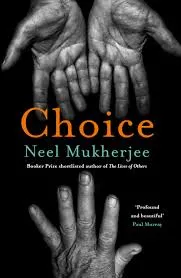Choice - Neel Mukherjee

In the first of the three novellas that form Choice, the protagonist wonders "can one leave the different strands that constitute a story or a novel seemingly unknit and hope - trust - readers to being them togther into meaning?"
It's an interesting question, and one that Choice explicitly plays with. It's obvious that the Indian family of the final story are the beneficiaries - or victims, depending on your perspective - of a scheme piloted by a character we meet in the first story, who laments that not all of the families who were given cows were successful. What's less clear is how the second story, which we might expect to act as a bridge between the first and last sections, connects. Is the victim of the hit and run at the start of the story - described, perhaps inaccurately, as a boy and a dog - the protagonist from the first story? (Probably). Is the female lead in the second story, who is told that the work she is writing about the life illegal immigrant driver of her Uber isn't her story to tell, actually the mysterious MN Opie from the first story? But how can that be the case if she's been involved in the killing of the editor MN Opie forms a relationship with, which presumably has to happen before she can write the book inspired by the stories she only comes to be told as a result of that act? How much of the legacy of her familial link to India, and the mysterious chronology of that personal history, is present in the third story? It's a very intricate web that likely has no answers, and that's very much the point.
Choice is, on the surface, a novel about the ramifications of the decisions made by the middle class lef wing, and many reviews that I've read since finishing the book have focused on that element. But personally I'm much more interested in what it has to say about storytelling and the questions it raises about form and the function of narrative and novels as a medium. This is very much my sort of thing, and I absolutely loved it.